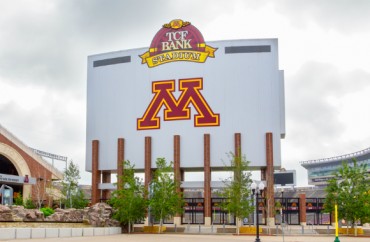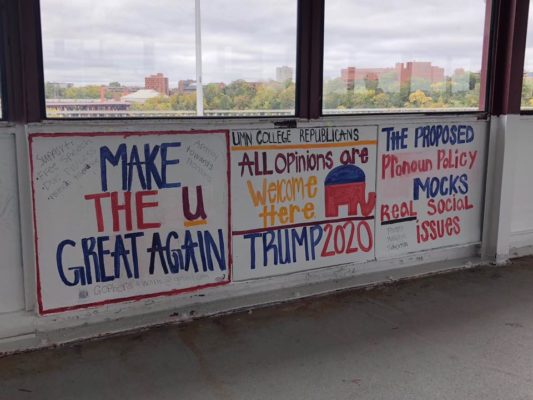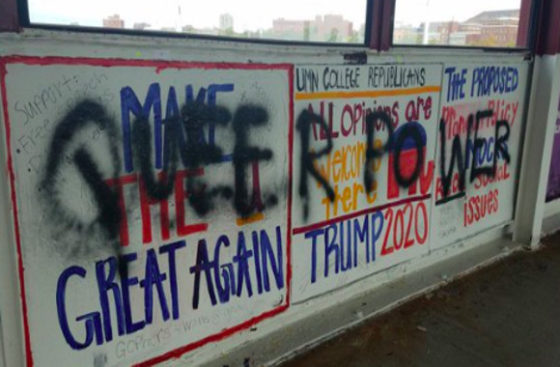
U. of Minnesota student complained of ‘microaggressions’ and ‘implicit bias’
During the fall 2018 semester at the University of Minnesota, an Asian-American student stopped by one of the restaurants in the Coffman Memorial Union to pick up a snack.
At the register, a food service worker said something the student didn’t understand. When the student said they didn’t get it, the woman at the register said she was saying “hello” in Japanese, and asked where the student was from.
“Wisconsin,” the student replied.
The cashier laughed and told the student to have a nice day, but the student did not find much humor in the experience. The student reported the cashier to the campus Bias Response and Referral Network, claiming “these type of microaggressions occur too often on campus” and “this implicit bias needs to be addressed.”
The bias team then referred the incident to dining services and referred the complaining student to the campus “Ethical Advocate Program” in case they “want to talk further about the experience.”
That according to a bias incident report recently obtained by The College Fix through a public records act request. In sum, a total of 51 total reports were filed with the university in the fall 2018 semester. The documents provided by the University of Minnesota have all personal identifying information redacted.
Another report included a complaint that a recent “Timely Warning” crime alert included a “vague” racial description of the suspects.
In 2015, some African-American men on campus complained that crime alerts including racial descriptors aid “stereotypes of Black men as threats” and “create a hostile campus climate.” Soon, the university changed its policy to include mention of a suspect’s race only “when there is sufficient detail that would help identify a specific individual or group.”
The 2018 complaint filed with the university claimed the alert was “extremely vague and racialized.” In response, the bias network contacted campus police and the University Relations office, both of which agreed “it was good to be reminded about only using race/ethnicity when they could be very specific when writing timely warnings.”
One of the most controversial incidents reported on was a banner posted by the school’s College Republicans during the annual “Paint the Bridge” week, during which student groups can sign up to paint a panel on the Washington Avenue Bridge. A total of nine bias complaints were filed over the College Republicans’ imagery.
The CR’s panel included phrases like “Make the U Great Again,” “All Opinions are Welcome Here,” “Trump 2020,” and “The Proposed Pronoun Policy Mocks Real Social Issues.”
Earlier in the year, the university had drafted proposed rules that could have punished anyone on campus that refused to use an individual’s preferred gender pronoun.
Eight of the reports were over the College Republicans’ statement on pronouns, and one was over the display’s use of the e-mail address [email protected]. One complaint called the Republicans’ display “transphobic” and “hateful.”

According to the document provided by the university, “All reporters were provided with responses that included the acknowledgment that protected free speech can also be harmful/hurtful speech.” The complaining students were given “support resources” and a referral to the Student Unions and Activities office.
Later, a separate bias complaint was filed after the Republican display was vandalized with the words “QUEER POWER” in black spray paint.
It was the third consecutive year the College Republicans’ mural was vandalized.

Other bias reports from fall 2018 included:
· An individual unaffiliated with the U of M campus emailed about a concern that there were no informational posters about sexual violence resources in the men’s restrooms. An e-mail from the Aurora Center, the campus sexual assault department, reassured the reporter that “there were posters in men’s, women’s and gender neutral restrooms in Coffman.”
· A professor was reported for allegedly using “homophobic” language in class. The student filing the report conceded the professor’s “intent” was to use the word as an “example,” but still believed it was “inappropriate and traumatizing.” The incident was referred to the campus Equal Opportunity and Affirmative Action office and the student was told to call the EOAA office if they wished to talk further.
· A student reported a professor for using “sexist and patronizing” language in class. (The language was not included in the document provided by the university.) The incident was referred to the EOAA with no further follow-up noted.
· A student reported another student for allegedly “staring at them in a departmental lounge based on their gender identity.” The complaint was forwarded to the school’s Office for Community Standards.
· A complaint was filed over an offensive Halloween costume at a campus departmental party. It was suggested that the department be made to undergo diversity training. The costume is not described in the document provided by the university.
· A complaint was filed after a campus group was found praying in a public space in a campus library. The incident was logged, and “support” was offered for the students who filed the complaint. The religious denomination of the praying students was not provided in the university’s document.
· Someone complained that there were no gender neutral restrooms in Tate Hall, although there were available restrooms marked “family restrooms.” The complainant believed that this was “awkward and not welcoming for gender non-conforming, non-binary folks seeking a gender neutral restroom.”
The individual was contacted by a member of the Bias Response and Referral Network who noted the designation of family restrooms “met code requirements for the renovation of Tate,” but that the university would consider adding a sign that said “gender neutral restroom.”
The University of Minnesota established their Bias Response and Referral Network in January 2016 at the urging of university President Eric Kaler.
According to the school’s website, the purpose of the bias response team is to “Refer reporters to appropriate campus offices that can effectively respond through investigation, educational coaching, or other resources depending on the nature of the incident.”
The team’s governing board includes members of, among others, the Campus Climate Engagement Team, Diversity Community of Practice, Office for Equity and Diversity, and the Equal Opportunity and Affirmative Action office.
The university’s website makes it clear the bias response team does not conduct investigations, take disciplinary action, or “impinge on free speech rights and academic freedom.”
This article is one of a series of exclusive College Fix reports about bias reporting systems on campuses across America:
University of Illinois: At University of Illinois, 265 bias complaints enforced by literal ‘speech police’
University of Utah: Professor accused of ‘hostile learning environment’ for assigning male authors
Indiana University: Janet Jackson’s nipple triggers bias complaint at Indiana University
Virginia Tech: Virginia Tech on the hunt for campus penis artists
North Carolina State University: Troll mocks campus anti-bias effort with complaint Warren’s Native American DNA claim was triggering
Michigan State University: Student files bias complaint against dorm roommate for watching Ben Shapiro video
University of Oregon: Bias report filed against professor for defending Brett Kavanaugh
Portland State University: Making jokes at Portland State gets you reported to its bias response team
SUNY-Binghamton: Off-campus road rage incident reported to university’s ‘Hate or Bias’ system
University of Florida: Recent bias complaints filed at U. Florida cite a grumpy professor, a racist Snapchat, and a crass joke
MORE: Minnesota lawmakers: Mandate ‘gender identity,’ ‘implicit bias’ training for teachers
IMAGE: Shutterstock.com





Please join the conversation about our stories on Facebook, Twitter, Instagram, Reddit, MeWe, Rumble, Gab, Minds and Gettr.